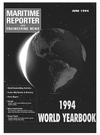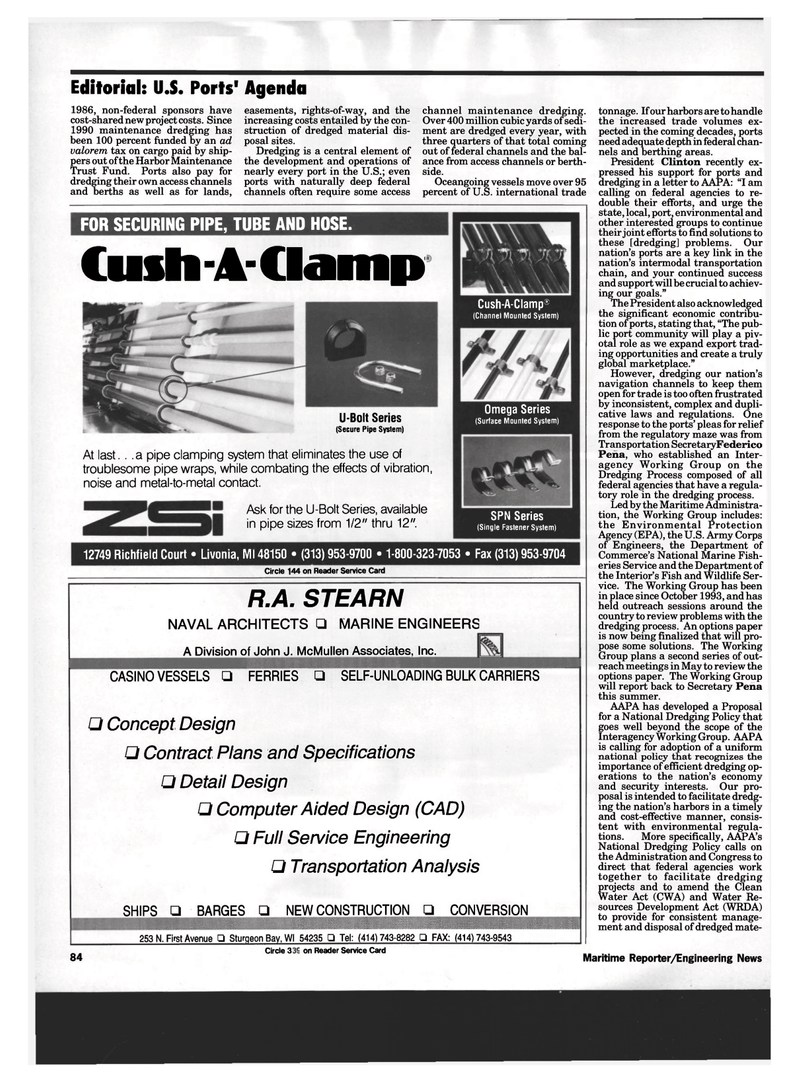
Page 74: of Maritime Reporter Magazine (June 1994)
Read this page in Pdf, Flash or Html5 edition of June 1994 Maritime Reporter Magazine
Editorial: U.S. Ports1 Agenda 1986, non-federal sponsors have cost-shared new project costs. Since 1990 maintenance dredging has been 100 percent funded by an ad valorem tax on cargo paid by ship- pers out of the Harbor Maintenance
Trust Fund. Ports also pay for dredging their own access channels and berths as well as for lands, easements, rights-of-way, and the increasing costs entailed by the con- struction of dredged material dis- posal sites.
Dredging is a central element of the development and operations of nearly every port in the U.S.; even ports with naturally deep federal channels often require some access channel maintenance dredging.
Over 400 million cubic yards of sedi- ment are dredged every year, with three quarters of that total coming out of federal channels and the bal- ance from access channels or berth- side.
Oceangoing vessels move over 95 percent of U.S. international trade
FOR SECURING PIPE, TUBE AND HOSE. (ush-A- (lamp
Cush-A-Clamp® (Channel Mounted System)
U-Bolt Series (Secure Pipe System)
At last. . .a pipe clamping system that eliminates the use of troublesome pipe wraps, while combating the effects of vibration, noise and metal-to-metal contact.
Ask for the U-Bolt Series, available in pipe sizes from 1/2" thru 12".
Omega Series (Surface Mounted System)
SPN Series (Single Fastener System) 12749 Richfield Court • Livonia, Ml 48150 • (313) 953-9700 • 1-800-323-7053 • Fax (313) 953-9704
Circle 144 on Reader Service Card 253 N. First Avenue • Sturgeon Bay, Wl 54235 • Tel: (414)743-8282 • FAX: (414)743-9543
RA STEARN
NAVAL ARCHITECTS • MARINE ENGINEERS
A Division of John J. McMullen Associates, Inc.
CASINO VESSELS • FERRIES • SELF-UNLOADING BULK CARRIERS • Concept Design • Contract Plans and Specifications • Detail Design • Computer Aided Design (CAD)
Q Full Service Engineering • Transportation Analysis
SHIPS • BARGES • NEW CONSTRUCTION • CONVERSION 84 Circle 283 on Reader Service Card tonnage. If our harbors are to handle the increased trade volumes ex- pected in the coming decades, ports need adequate depth in federal chan- nels and berthing areas.
President Clinton recently ex- pressed his support for ports and dredging in a letter to AAPA: "I am calling on federal agencies to re- double their efforts, and urge the state, local, port, environmental and other interested groups to continue their joint efforts to find solutions to these [dredging] problems. Our nation's ports are a key link in the nation's intermodal transportation chain, and your continued success and support will be crucial to achiev- ing our goals."
The President also acknowledged the significant economic contribu- tion of ports, stating that, "The pub- lic port community will play a piv- otal role as we expand export trad- ing opportunities and create a truly global marketplace."
However, dredging our nation's navigation channels to keep them open for trade is too often frustrated by inconsistent, complex and dupli- cative laws and regulations. One response to the ports' pleas for relief from the regulatory maze was from
Transportation SecretaryFederico
Pena, who established an Inter- agency Working Group on the
Dredging Process composed of all federal agencies that have a regula- tory role in the dredging process.
Led by the Maritime Administra- tion, the Working Group includes: the Environmental Protection
Agency (EPA), the U.S. Army Corps of Engineers, the Department of
Commerce's National Marine Fish- eries Service and the Department of the Interior's Fish and Wildlife Ser- vice. The Working Group has been in place since October 1993, and has held outreach sessions around the country to review problems with the dredging process. An options paper is now being finalized that will pro- pose some solutions. The Working
Group plans a second series of out- reach meetings in May to review the options paper. The Working Group will report back to Secretary Pena this summer.
AAPA has developed a Proposal for a National Dredging Policy that goes well beyond the scope of the
Interagency Working Group. AAPA is calling for adoption of a uniform national policy that recognizes the importance of efficient dredging op- erations to the nation's economy and security interests. Our pro- posal is intended to facilitate dredg- ing the nation's harbors in a timely and cost-effective manner, consis- tent with environmental regula- tions. More specifically, AAPA's
National Dredging Policy calls on the Administration and Congress to direct that federal agencies work together to facilitate dredging projects and to amend the Clean
Water Act (CWA) and Water Re- sources Development Act (WRDA) to provide for consistent manage- ment and disposal of dredged mate-
Maritime Reporter/Engineering News

 73
73

 75
75
